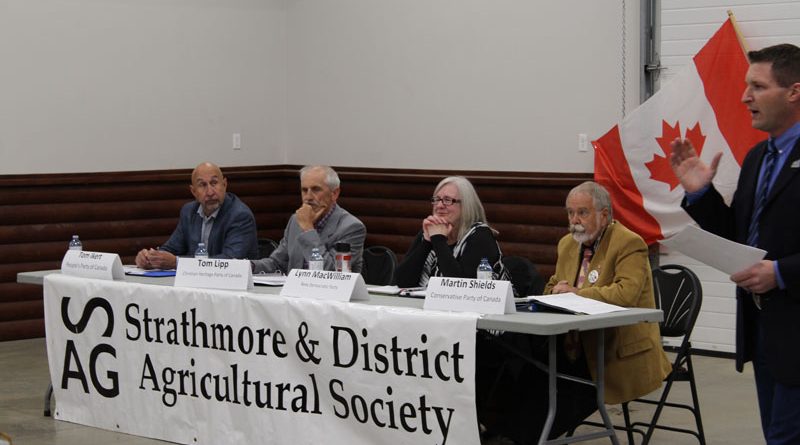Candidates forum leaves some questions unanswered
By Deirdre Mitchell-MacLean Times Contributor


Deirdre Mitchell-MacLean Photo
On the topic of agriculture, all candidates were in agreement that entrepreneurial motivation was key to building trade relations.
“China is a huge market,” Shields said, “but we need to be on an equal playing field.”
In response to a question on rural crime, there was a greater focus on courts than policing.
“The first line of defence is not the police,” Lipp stated. “We need to be able to protect our property without risk of what’s happening in Okotoks (where a landowner is being sued by a potential thief whom the owner accidentally shot).”
Only Lipp had an alternate solution for dealing with criminal behaviour: “Replace incarceration with restitution,” he suggested.
Alberta’s economy has not rebounded with the election of a new provincial government, so it is still top of mind for federal candidates – yet not one of them put forward a new idea.
Shields said his party would get rid of Bills C69 and C48, while Ikert said he would use the constitution to assert Alberta’s rights over opposition. Meanwhile, MacWilliam suggested using the Churchill, Man. port for eastern access, while Lipp said he felt pipelines could unite Canada much like the railway did in the late 1800s.
When asked where the candidates stand on energy and the environment, energy took top billing from most of the candidates, save one, as reflected in their party’s platforms.
“Oil and gas is important, but it’s not renewable,” said MacWilliam. “Let’s also create an economy of renewable resources. There are economic opportunities in the green economy; Alberta could be a hub of environmental innovation.”
On individual rights and freedoms, each candidate had a passionate response.
“You have to be able to tell the truth,” said Ikert. “Free speech requires people to be offended. We should be able to have an honest conversation about immigration without being called a racist.”
With about 60 people in attendance and the average attendee being in the politically engaged age range of 50+, one young man stood out. Graham Boehm, a 14-year-old student at Holy Cross Collegiate, came to see the forum – his first.
“I would have liked a question on how to deal with climate change,” he said afterwards. “It’s one of the top concerns for me.”
Boehm added he would have liked to hear more about how to better accommodate different religions, languages, cultures and communities, such as LGBTQ.
“How do we, do they, plan to lessen discrimination in Canada?” he asked.
Such concerns had an opportunity to become election issues this year with both Justin Trudeau’s “brownface” revelations and Jagmeet Singh being the first Sikh leader to ever be in a race for Prime Minister. If there are more people like Graham paying attention, perhaps next election, they will be.
